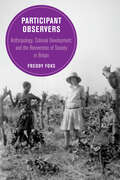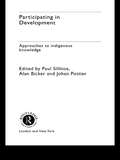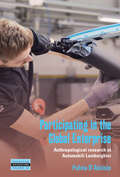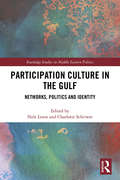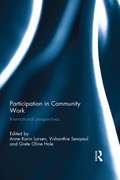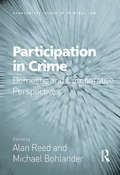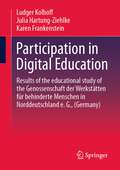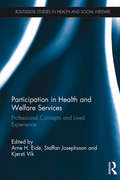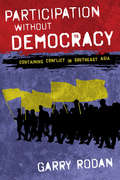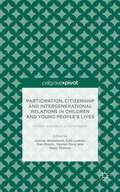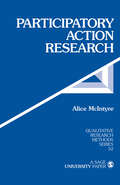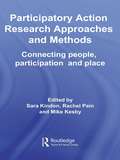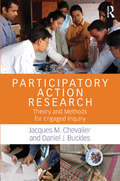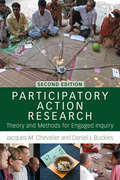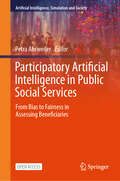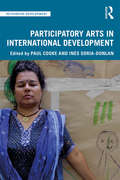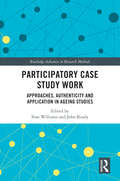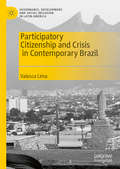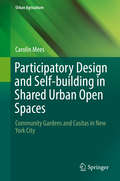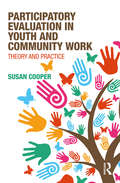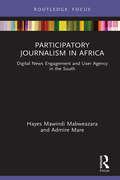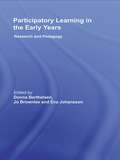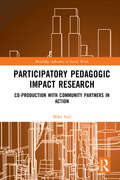- Table View
- List View
Participant Observers: Anthropology, Colonial Development, and the Reinvention of Society in Britain (Berkeley Series in British Studies #22)
by Dr. Freddy FoksSocial anthropology was at the forefront of debates about culture, society, and economic development in the British Empire. This book explores the discipline's rise in the interwar period, crisis amid decolonization, and ironic reemergence in the postwar metropole. Across the humanities and social sciences, activists and scholars used anthropological concepts forged in empire to rethink British society at midcentury. Participant Observers shows how colonial anthropology helped define the social imagination of postimperial Britain. Part institutional history of the discipline's formation, part cultural history of its impact, this is the first account of social anthropology's pivotal role in Britain's intellectual culture.
Participating in Development: Approaches to Indigenous Knowledge (ASA Monographs #Vol. 39)
by Paul Sillitoe Johan Pottier Alan BickerFirst published in 2002. Routledge is an imprint of Taylor & Francis, an informa company.
Participating in the Global Enterprise: Anthropological Research at Automobili Lamborghini (Dislocations)
by Fulvia D'AloisioViewed through an anthropological lens, Automobili Lamborghini, the renowned Italian factory of super cars, presents a compelling case study. As an ethnography spanning three years, the book focuses on the different perspectives of the managers and the workers and the effects of the organization on their lives. It highlights the increasing value of Automobili Lamborghini for the VW Group globally and analyzes the organizational structure and the industrial relations (IR) system, the so-called Mitbestimmung (co-determination), which represents an interesting and original amalgamation between the German model of IR and the Italian tradition of both managerial and trade-union action and behaviour.
Participation Culture in the Gulf: Networks, Politics and Identity (Routledge Studies in Middle Eastern Politics)
by Nele Lenze Charlotte SchriwerThis book examines the civil–social interactions which have shaped and continue to influence the political and social development of modern Gulf societies. It analyses the influence of public and private social spaces, such as sports arenas and dawawin as well as developments in the legal and cultural spheres. Geographically, the volume covers Bahrain, Iran, Kuwait, Oman, Qatar, Saudi Arabia and the UAE. Each chapter discusses a different aspect of current trends in society, offering a multidimensional perspective on recent developments. In so doing, the chapters highlight the existence of a growing participation culture as a force for dynamic social change in a global context. Bringing to attention the continuing social change in public and private spaces, which have increased public social interactions within the last ten years, this books also demonstrates the opening of dialogues between the public and the authorities. The contributors are established scholars living in the Gulf, as well as academics with long-term field research in the region, thus providing unique perspectives on current sociopolitical trends in the Gulf states. Participation Culture in the Gulf will be useful to students and scholars of Middle Eastern politics and society, as well as social movements and political participation more generally.
Participation in Child Protection: Theorizing Children's Perspectives
by Mandy DuncanThere have long been doubts within social work about the viability of reconciling participatory practice with the statutory power that comes hand-in-hand with child protection work. This book explores this issue by proposing an original theory of children’s participation within statutory child protection interventions. It prioritises children’s voices through presentation of a wide collection of children’s experiences of the child protection system including three unique in-depth accounts. Identifying the different ways in which children engage with professionals in the child protection process, Duncan explores why they act in the ways that they do. The book reveals why some children are sceptical participants or become disaffected with the system whilst others participate more positively within it. Participation in Child Protection will be of interest to students and scholars across a range of disciplines, including social work, sociology, psychology, counselling, law and education, as well as child protection professionals such as social workers, child protection police officers, health visitors and teachers.
Participation in Community Work: International Perspectives
by Anne Karin Larsen Vishanthie Sewpaul Grete Oline HoleParticipation is a key community work method and this text, written by an international selection of authors, covers innovative approaches in community based education and practice. Including real-life case studies of participatory practice, it offers new definitions of community work, organisation and development and will challenge and inspire all those involved in community work practice and research. Divided into four parts, Participation in Community Work begins by exploring theoretical aspects of participation and the co-construction of knowledge, including the ethics of participation. The second part focuses on the potential of participatory learning and action research, with chapters presenting key techniques followed by case studies. The third part looks at power and participation, addressing issues of inclusivity, capacity and democracy-building and giving examples from a range of research and field projects. Finally, the fourth part begins the discussion of new and emerging challenges for community work globally. This unique book is suitable for students, researchers and practitioners interested in participation and community development from a range of disciplines, including community work itself through social work and youth work to health promotion.
Participation in Crime: Domestic and Comparative Perspectives (Substantive Issues in Criminal Law)
by Alan Reed Michael BohlanderFollowing on from the earlier edited collection, Loss of Control and Diminished Responbility, this book is the first volume in the Substantive Issues in Criminal Law series. It serves as a leading point of reference in the area relating to participation in crime and identifies the need for a consistent approach to the doctrinal and theoretical underpinnings of complicity liability. With a section on the UK analysing points of current interest, the book also has a large comparative section dealing with foreign jurisdictions and examines on the basis of a unified research grid how different legal systems treat core issues of participation in the context of criminal law. This book is a valuable reference resource for those in the criminal justice community in the UK and abroad and for academics, the judiciary and policy-makers.
Participation in Digital Education: Results of the educational study of the Genossenschaft der Werkstätten für behinderte Menschen in Norddeutschland e. G., (Germany)
by Ludger Kolhoff Julia Hartung-Ziehlke Karen FrankensteinDigital education offers support the equal participation of people with disabilities in lifelong learning. They thus provide access for independent living and participation in all areas of life and are highlighted as a central factor of successful inclusion. In order to give people with impairment the opportunity to participate in digital education, the educational and qualification needs of people with impairment in 10 member institutions of the Cooperative of Workshops for Disabled People in Northern Germany e.G. were recorded in 2016 - 2018. In this volume, existing analyses on the educational needs of people with impairments and existing educational offers are evaluated and more than 500 people with impairments are interviewed. On the basis of this study, needs-oriented digital educational offers are created in a targeted manner.
Participation in Health and Welfare Services: Professional Concepts and Lived Experience (Routledge Studies in Health and Social Welfare)
by Arne H. Eide Staffan Josephsson Kjersti VikToday, healthy ageing and active, meaningful lives are core values and aims for international and national health policies. Health services are challenged to ensure that the recipients of their services are active participants in their own care and beyond. Participation allows patients to become less dependent on healthcare providers, increasing their control over their own treatment and health. Increasingly, the idea of ‘participation’ is shifting, from participation in services to participation in mainstream society. This book examines the concept of participation, as well as the different meanings it takes on in the context of health and welfare services. It asks how services can enable and stimulate participation outside of those services. The contributions in this volume particularly focus on participation as engagement in daily life and ‘everyday life’ in order to develop the field of participation beyond the sphere of health and social care services. This book will appeal to researchers in the fields of health and social care, social services, occupational therapy and the sociology of health and illness. It will be of interest to practitioners of health and welfare services.
Participation without Democracy: Containing Conflict in Southeast Asia
by Garry RodanOver the past quarter century new ideologies of participation and representation have proliferated across democratic and non-democratic regimes. In Participation without Democracy, Garry Rodan breaks new conceptual ground in examining the social forces that underpin the emergence of these innovations in Southeast Asia. Rodan explains that there is, however, a central paradox in this recalibration of politics: expanded political participation is serving to constrain contestation more than to enhance it.Participation without Democracy uses Rodan’s long-term fieldwork in Singapore, the Philippines, and Malaysia to develop a modes of participation (MOP) framework that has general application across different regime types among both early-developing and late-developing capitalist societies. His MOP framework is a sophisticated, original, and universally relevant way of analyzing this phenomenon. Rodan uses MOP and his case studies to highlight important differences among social and political forces over the roles and forms of collective organization in political representation. In addition, he identifies and distinguishes hitherto neglected non-democratic ideologies of representation and their influence within both democratic and authoritarian regimes. Participation without Democracy suggests that to address the new politics that both provokes these institutional experiments and is affected by them we need to know who can participate, how, and on what issues, and we need to take the non-democratic institutions and ideologies as seriously as the democratic ones.
Participation, Citizenship and Intergenerational Relations in Children and Young People’s Lives: Children and Adults in Conversation
by Nigel Thomas Cath Larkins Joanne Westwood Dan Moxon Yasmin PerryResearch about children and young people's participation and involvement in research is an emerging area of academic inquiry. Based on the themes of participation, citizenship and intergenerational relations, this edited collection draws on the latest research in this area, and includes chapters co-authored with children and young people.
Participatory Action Research
by William Foote WhyteThis text provides perspectives on the practice and evolution of participatory action research.
Participatory Action Research (Qualitative Research Methods)
by Alice McIntyreParticipatory Action Research (PAR) introduces a method that is ideal for researchers who are committed to co-developing research programs with people rather than for people. The book provides a history of this technique, its various strands, and the underlying tenets that guide most projects. It then draws on two PAR projects that highlight three integral dimensions: the meaning of participation; the way action manifests itself; and the strategies for gathering, analyzing, and disseminating information. Author Alice McIntyre describes the various ways in which PAR is carried out depending on, for example, the issue under investigation, the site of the project, the project participants, people′s access to resources, and other related issues.Intended Audience: This resource is an ideal supplement for graduate courses PAR, qualitative research, and various types of action-based research.
Participatory Action Research Approaches and Methods: Connecting People, Participation and Place (Routledge Studies in Human Geography)
by Rachel Pain Mike Kesby Sara KindonParticipatory Action Research (PAR) approaches and methods have seen an explosion of recent interest in the social and environmental sciences. PAR involves collaborative research, education and action which is oriented towards social change, representing a major epistemological challenge to mainstream research traditions. It has recently been the subject of heated critique and debate and rapid theoretical and methodological development. This book captures these developments, exploring the justification, theorisation, practice and implications of PAR. It offers a critical introduction to understanding and working with PAR in different social, spatial and institutional contexts. The authors engage with PAR’s radical potential, while maintaining a critical awareness of its challenges and dangers. The book is divided into three parts. The first part explores the intellectual, ethical and pragmatic contexts of PAR; the development and diversity of approaches to PAR; recent poststructuralist perspectives on PAR as a form of power; the ethic of participation; and issues of safety and well-being. Part two is a critical exploration of the politics, places and practices of PAR. Contributors draw on diverse research experiences with differently situated groups and issues including environmentally sustainable practices, family livelihoods, sexual health, gendered experiences of employment, and specific communities such as people with disabilities, migrant groups, and young people. The principles, dilemmas and strategies associated with participatory approaches and methods including diagramming, cartographies, art, theatre, photovoice, video and geographical information systems are also discussed. Part three reflects on how effective PAR is, including the analysis of its products and processes, participatory learning, representation and dissemination, institutional benefits and challenges, and working between research, action, activism and change. The authors find that a spatial perspective and an attention to scale offer helpful means of negotiating the potentials and paradoxes of PAR. This approach responds to critiques of PAR by highlighting how the spatial politics of practising participation can be mobilised to create more effective and just research processes and outcomes. The book adds significant weight to the recent critical reappraisal of PAR, suggesting why, when, where and how we might take forward PAR’s commitment to enabling collaborative social transformation. It will be particularly useful to researchers and students of Human Geography, Development Studies and Sociology.
Participatory Action Research: Theory and Methods for Engaged Inquiry
by Jacques M. Chevalier Daniel J. BucklesThis book addresses a key issue in higher learning, university education and scientific research: the widespread difficulty researchers, experts and students from all disciplines face when trying to contribute to change in complex social settings characterized by uncertainty and the unknown. More than ever, researchers need flexible means and grounded theory to combine people-based and evidence-based inquiry into challenging situations that keep evolving and do not lend themselves to straightforward technical explanations and solutions. In this book, the authors propose innovative strategies for engaged inquiry building on insights from many disciplines and lessons from the history of Participatory Action Research (PAR), including French psychosociology. The ongoing evolution of PAR has had a lasting legacy in fields ranging from community development to education, public engagement, natural resource management and problem solving in the workplace. All formulations have in common the idea that research must be done ‘with’ people and not ‘on’ or ‘for’ people. Inquiry of this kind makes sense of the world through efforts to transform it, as opposed to simply observing and studying human behaviour and people’s views about reality, in the hope that meaningful change will happen somewhere down the road. The book contributes many new tools and conceptual foundations to this longstanding tradition, grounded in real-life examples of collective fact-finding, analysis and decision-making from around the world. It provides a modular textbook on participatory action research and related methods, theory and practice, suitable for a wide range of undergraduate and postgraduate courses, as well as working professionals.
Participatory Action Research: Theory and Methods for Engaged Inquiry
by Jacques M. Chevalier Daniel J. BucklesFully revised and updated, this second edition of Participatory Action Research (PAR) provides new theoretical insights and many robust tools that will guide researchers, professionals and students from all disciplines through the process of conducting action research ‘with’ people rather than ‘for’ them or ‘about’ them. PAR is collective reasoning and evidence-based learning focussed on social action. It has immediate relevance in fields ranging from community development to education, health, public engagement, environmental issues and problem solving in the workplace. This new edition has been extensively revised to create a user-friendly textbook on PAR theory and practice, including: updated references and a comprehensive overview of different approaches to PAR (pragmatic, psychosocial, critical); more emphasis on the art of process design, especially in complex social settings characterized by uncertainty and the unknown; developments in the use of Web2 collaborative tools and digital strategies to support real-time data gathering and processing; updated examples and stories from around the world, in a wide range of fields; critical commentaries on major issues in the social sciences, including stakeholder theory, systems thinking, causal analysis, monitoring and evaluation, research ethics, risk assessment and social innovation. This modular textbook provides novel perspectives and ideas in a longstanding tradition that strives to reconnect science and the inquiry process with life in society. It provides coherent and critical treatment of core issues in the ongoing evolution of PAR, making it suitable for a wide range of undergraduate and postgraduate courses. It is intended for use by researchers, students and working professionals seeking to improve or rethink their approach to co-creating knowledge and supporting action for the well-being of all.
Participatory Artificial Intelligence in Public Social Services: From Bias to Fairness in Assessing Beneficiaries (Artificial Intelligence, Simulation and Society)
by Petra AhrweilerThis open access edited volume focuses on fairness issues concerning the use of artificial intelligence (AI) for social service provision in national welfare systems. With this, it touches upon important questions in the innovation agenda of countries across continents about the ethics, justice, quality, responsibility, accountability, and transparency to use AI for state functions. The volume shows that in many countries, AI, or at least data analytics methods, are already in place to support the assessment of beneficiaries for deciding on the value criteria to distinguish between legal /fraudulent, deserving/non-deserving, or needy/non-needy recipients. The book provides a cross-cultural comparison of AI-based social assessment among national welfare systems of 9 countries across 4 continents: Spain, Estonia, Germany, Iran, India, Nigeria, Ukraine, China and USA. Based on participatory research results from multi-stakeholder inputs, especially those from vulnerable groups, the chapters in this volume show that value criteria for fairness and social justice are context-bound and vary across the globe. Furthermore, they are in constant flux, aligned to social change. Thus, the volume looks at pathways to developing culture-sensitive, responsive and participatory AI for social assessment in public service provision. The contributions are interdisciplinary and introduce perspectives from the fields of sociology, computational social science, computer science and public policy. This topical volume is of interest to a wide readership.
Participatory Arts in International Development (Rethinking Development)
by Paul Cooke Inés Soria-DonlanThis book explores the practical delivery of participatory arts projects in international development. Bringing together an interdisciplinary group of academics, international development professionals and arts practitioners, the book engages honestly with the competing challenges faced by the different groups of people involved. Participatory arts are becoming increasingly popular in international development circles, fuelled in part by the increased accessibility of audio-visual media in the digital age, and also by the move towards participatory discourses in the wake of the UN’s Agenda 2030. The book asks: What do participatory arts projects look like in practice, and why are they used as an international development tool? How can we develop practical and sustainable development projects on the ground, localising best practice according to cultural, economic and linguistic contexts? What are the enablers of, and barriers to, successful participatory initiatives, and how can we evaluate past projects to learn and feed into future projects? Written to appeal to both academics and practitioners, this book would also be suitable for teaching on courses related to participatory development, community arts, and culture and development.
Participatory Case Study Work: Approaches, Authenticity and Application in Ageing Studies (Routledge Advances in Research Methods)
by Sion Williams and John KeadyParticipatory Case Study Work shows academic co-researchers how to adapt and implement their methods so that data collection and analysis is authentically participatory. At the heart of this text is advocating a participatory approach to case study work, with co-construction as a catalyst for shared understanding and action in advancing ageing studies. Whilst case study research has a relatively long tradition in the canon of research methodologies, little attention has so far been paid to the importance and value of participatory case study work. This is surprising as its egalitarian and democratic value-base naturally lends itself to the co-production and co-creation of personal and collective theory drawn directly from lived experience. The book brings together over 15 years’ worth of participatory case study work in ageing studies in which the editors have been actively involved as either front-line researchers or as supervisors to PhD and MPhil studies adopting the methodology, and from where each of the contributors are selected. Real-life case examples are shared in the main chapters of the book and they provide direction as to how learning can be applied to other settings. The chapters also contain key references and recommended reading. This volume will appeal to undergraduate and postgraduate students as well as postdoctoral researchers interested in fields such as: Research Methods, Qualitative Methods, Ageing Studies and Mental Health Studies.
Participatory Citizenship and Crisis in Contemporary Brazil (Governance, Development, and Social Inclusion in Latin America)
by Valesca LimaThis book discusses the issues of citizen rights, governance and political crisis in Brazil. The project has a focus on “citizenship in times of crisis,” i.e., seeking to understand how citizenship rights have changed since the Brazilian political and economic crisis that started in 2014. Building on theories of citizenship and governance, the author examines policy-based evidence on the retractions of participatory rights, which are consequence of a stagnant economic scenario and the re-organization of conservative sectors. This work will appeal to scholarly audiences interested in citizenship, Brazilian politics, and Latin American policy and governance.
Participatory Design and Self-building in Shared Urban Open Spaces: Community Gardens And Casitas In New York City (Urban Agriculture Ser.)
by Carolin MeesThe book investigates the development of community gardens with self-built structures, which have existed as a shared public open space land use form in New York City’s low-come neighborhoods like the South Bronx since the 1970s. These gardens have continued to be part of the urban landscape until today, despite conflicting land use interests, changing residents groups and contradictory city planning. Both community gardens and self-built structures are created in a participatory design and self-built effort by urban residents and are an expression of the individual gardeners’ preferences, their cultural background and the decisions made by the managing residents’ group in regards to the needs of their neighborhood. Ultimately community gardens with self-built structures are an expression of the people’s will to commonly use this land for open and enclosed structures next to their homes in the city and need to be included in future urban planning.
Participatory Evaluation in Youth and Community Work: Theory and Practice
by Susan CooperEvaluation is an essential element of professional practice. However, there is little in the literature that is designed to help students involve and support young people in evaluating the impact of youth work activities. This comprehensive book explores current thinking about evaluation in the context of youth work and community work and offers both theoretical understanding and practical guidance for students, practitioners, organisational leaders and commissioners. Part 1 provides underpinning knowledge of the origins, purpose and functions of evaluation. It charts the developments in evaluation thinking over the past 50 years, and includes an exploration of ‘theory of change’. Concepts such as impact, impact measurement and shared measurement are critically examined to illustrate the political nature of evaluation. Findings from empirical research are used to illuminate the challenges of applying a quasi-experimental paradigm of evaluation of youth and community work. Part 2 introduces the reader to participatory evaluation and presents an overview of the histories, rationale and underpinning principles. Empowerment evaluation, collaborative evaluation and democratic evaluation are examined in detail, including practice examples. Transformative Evaluation, an approach specifically designed for youth and community work, is presented. Part 3 focuses on the ‘doing’ of participatory evaluation and offers guidance to those new to participatory evaluation in youth and community work and a helpful check for those already engaging. It provides valuable information on planning, methods, data and data analysis and processes for sharing knowledge. This essential text will enable the reader to reconstruct evaluation as a tool for learning as well as a tool for judging value. It provides a comprehensive reference, drawing on a wide range of literature and practice examples to support those involved in youth and community work to develop and implement participatory approaches to evaluating and communicating the meaning and value of youth and community work to a wider audience.
Participatory Journalism in Africa: Digital News Engagement and User Agency in the South (Disruptions)
by Admire Mare Hayes Mawindi MabweazaraThis book offers an African perspective on how news organisations are embracing digital participatory practices as part of their everyday news production, dissemination and audience engagement strategies. Drawing on empirical evidence from news organisations in sub-Saharan Africa, Participatory Journalism in Africa investigates and maps out professional practices emerging with journalists’ direct interactions with readers and sources via online user comment spaces and social media platforms. Using a social constructivist approach, the book focuses on the challenges relating to the elite-centric nature of active participation on the platforms, while also highlighting emerging ethical and normative dilemmas. The authors also point to the hidden structural controls to participation and user engagement associated with artificial intelligence, chatbots and algorithms. These obstacles, coupled with low digital literacy levels and the well-established pitfalls of the digital divide, challenge the utopian view that in Africa interactive digital technologies are the sine qua non spaces for democratic participation. This is a valuable resource for academics, journalists and students across a wide range of disciplines including journalism studies, communication, sociology and political science.
Participatory Learning in the Early Years: Research and Pedagogy (Routledge Research in Education)
by Eva Johansson Jo Brownlee Donna BerthelsenThe early years are an important period for learning, but the questions surrounding participatory learning amongst toddlers remain under-examined. This book presents the latest theoretical and research perspectives about how ECEC (Early Childhood Education and Care) contexts promote democracy and citizenship through participatory learning approaches. The contributors provide insight into national policies, provisions, and practices and advance our understandings of theory and research on toddlers’ experiences for democratic participation across a number of countries, including the UK, Australia, New Zealand, the United States, Canada, Sweden, and Norway.
Participatory Pedagogic Impact Research: Co-production with Community Partners in Action (Routledge Advances in Social Work)
by Mike SealInvolvement of community partners in the structure and design of services is largely accepted in principle, but its practice is heavily contested. This book argues that the co-production of research is one of the best ways to involve community partners. As well as having intrinsic value in and of itself, research embeds a culture of learning, co-production and of valuing research within organizations. It also creates a mechanism for developing evidence for, monitoring and evaluating subsequent ideas and initiatives that arise from other co-production initiatives. The book makes a case for research to be a synthesis of participatory research, critical pedagogy, peer research and community organizing. It develops a model called Participatory Pedagogic Impact Research (PPIR). Participatory research is often criticized for not having the impact it promises. PPIR ensures that the issues chosen, and the recommendations developed, serve the mutual self-interest of stakeholders, are realistic and realizable. At the same time this approach pushes the balance of power towards the oppressed using methods of dissemination that hold decision makers to account and create real change. PPIR also develops a robust method for creatively identifying issues, methods and analytic frameworks. Its third section details case studies across Europe and the United States of PPIR in action with professional researchers’ and community partners’ reflections on these experiences. This book gives a unique articulation of what makes for genuinely critical reflective spaces, something underdeveloped in the literature. It should be considered essential reading for both participatory research academics and those involved in health and social care services in the planning, commissioning and delivery of services.
